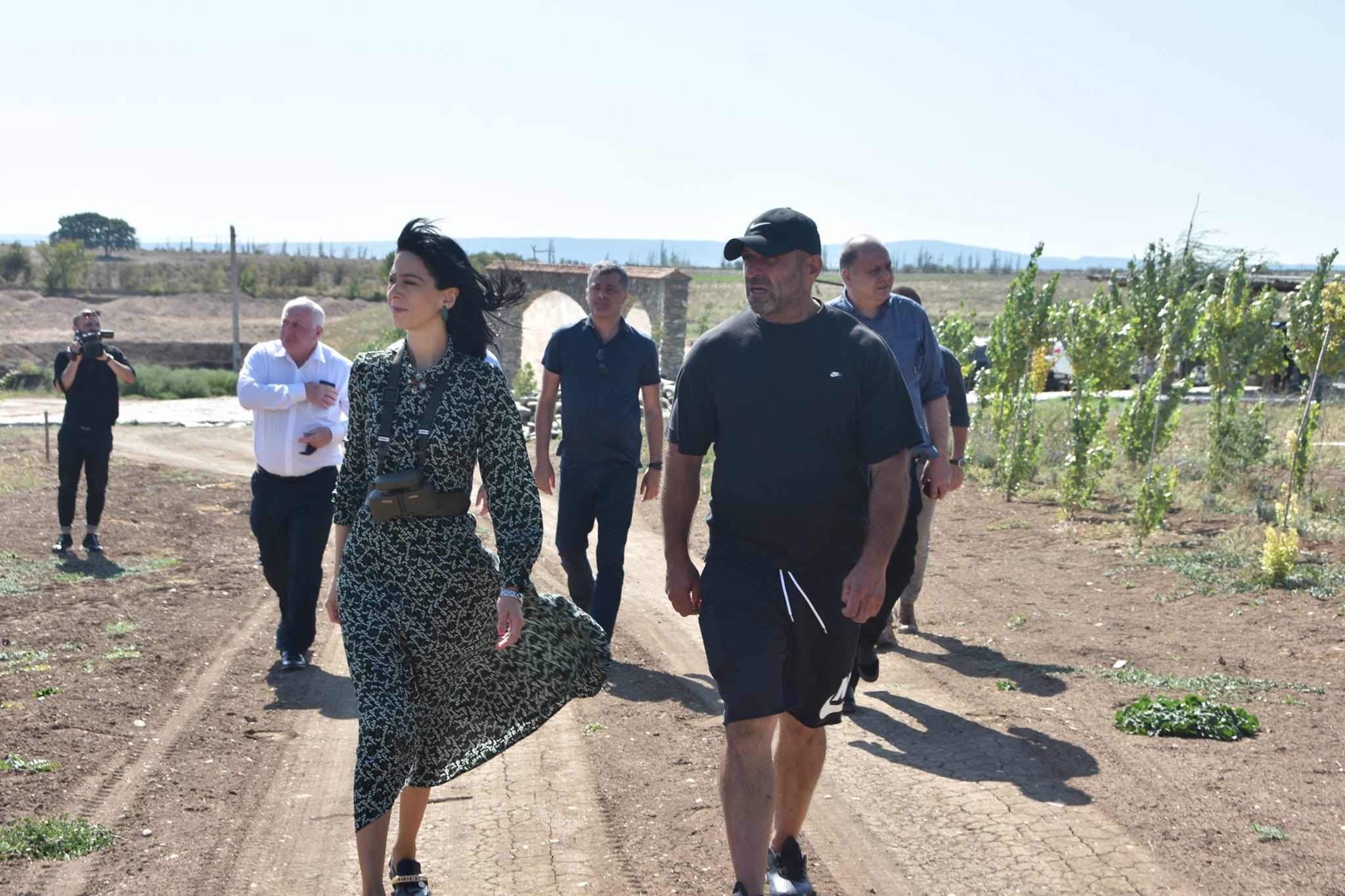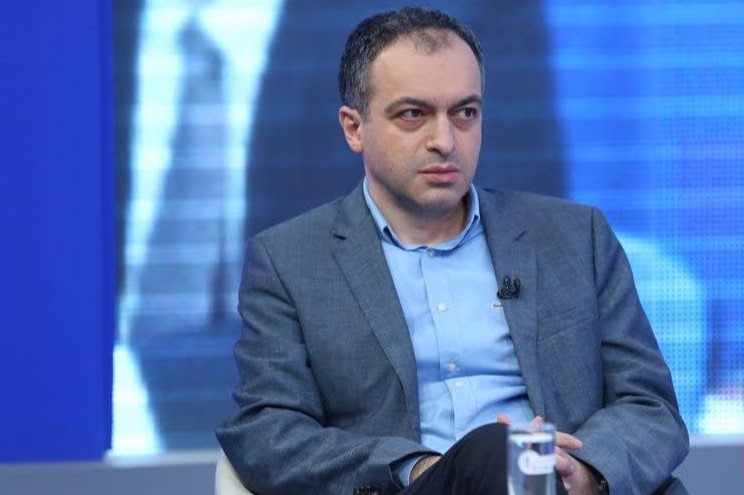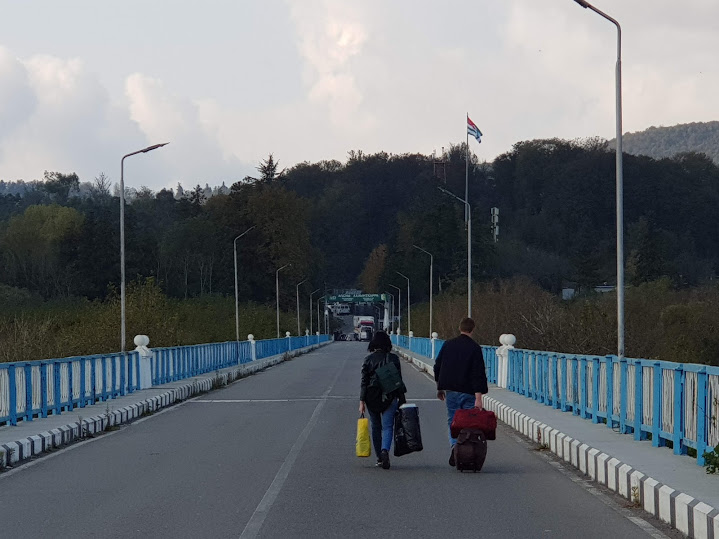
Since a change of power in Abkhazia in March, the new authorities in Sukhumi (Sukhum) have made repeated calls for increased dialogue with Tbilisi. But with Georgia on the eve of parliamentary elections, it is not yet clear if Georgia will take them up.
The day after being elected president of Abkhazia on 22 March, Aslan Bzhaniya voiced his wish to see Abkhazian-Georgian dialogue.
He suggested that in parallel to the current Geneva format of dialogue, Abkhazian and Georgian officials needed a separate ‘small avenue’ for bilateral talks on ‘problems related to border’. The Geneva format includes Georgian, Russian, US, Abkhazian, and South Ossetian representatives and is co-chaired by the EU, OSCE, and UN.
This was one of many such statements from the new government in Abkhazia calling for deepening economic ties and increased dialogue with the authorities in Tbilisi.
In an interview with RFE/RL’s Ekho Kavkaza on 8 August, Sergei Shamba, a former foreign minister and currently Secretary of Abkhazia’s Security Council, also advocated for peace between Abkhazians and Georgians.
‘It’s impossible to constantly live in enmity… we need to think about the future, about our children. We can’t raise a new generation with hate’, Shamba said.
This is a marked change in tone from the past two decades, when officials in Abkhazia have demanded that Georgia recognise Abkhazia as an independent state before bilateral dialogue could take place.
At a press conference hosted by Russian state-run news agency Interfax in July, president Bzhaniya said that the Abkhazian and Georgian sides should agree to sign a non-use of force agreement. However, he said they were no longer demanding that Georgia recognise Abkhazia as a precondition for dialogue.
Will Tbilisi take up the call?
Despite repeated statements from Bzhaniya and others, their calls for dialogue have mostly fallen on deaf ears.
The only official response from Tbilisi came from the Deputy Head of the State Security Service, Alexander Khojevanishvili, who suggested that Bzhaniya lodge his proposals through the Geneva format.
Despite the apparent silence, such proposals are not unprecedented. In a 2018 interview with OC Media, then Minister of Reconciliation and Civic Equality, Ketevan Tsikhelashvili said that she had personally approached Abkhazian officials to set up an alternative line of talks, but that this had not been reciprocated.
Nino Kalandarishvili, who chairs the board of the Tbilisi-based Institute for the Study of Nationalism and Conflicts, said it was unlikely there was any communication between Georgian and Abkhazian sides on Bzhaniya’s proposals, even through back channels.
‘Direct talks does not necessarily mean a Georgian Prime Minister and Abkhazian President talking directly. There could be some sort of “dialogue without a tie” ’, Kalandarishvli told OC Media.
She concluded that the Georgian Government was likely mindful of possible domestic repercussions.
The issue of bilateral talks with Abkhazian officials has proved to be a politically combustible idea in Georgian politics in recent years.
Georgian PM Giorgi Kvirikashvili faced domestic backlash and was even accused of being ‘pro-Russian’ for suggesting that Georgia was ‘ready for direct dialogue with the Abkhazians and the Ossetians’. In 2013, then Georgian PM, currently the Chair of Georgian Dream, Bidzina Ivanishvili became a target of similar criticism for suggesting the same.
Despite this, the Office of the Georgian Minister for Reconciliation told OC Media that they were ‘fully ready to broaden dialogue with the Abkhaz society’ to solve social-economic, humanitarian and human rights-related problems of people living along the dividing line.
The Office, which Minister Tea Akhvlediani took over only recently, did not expand specifically on the format or timing of any bilateral talks with the Abkhazian government, but neither did they outright reject it.
‘The government, from its highest level, had declared on more than one occasion that our main goal is to have a dialogue focused on peace and prosperity of our population living beyond the occupation line as well as on rebuilding trust and on reconciliation of societies that had been divided by war’.

As Georgian parliamentary elections set for 31 October approach, opposition parties have also remained largely silent on the proposals.
The exception was Free Georgia, a socially conservative, left-leaning party led by Kakha Kukava, who gave the proposal a ringing endorsement.
On the anniversary of the start of military conflict in Abkhazia on 14 August, the party insisted that ‘peaceful dialogue between Georgians and Abkhazians has no alternative’.
‘The statements coming from the other side of the Enguri on resuming Georgian-Abkhaz dialogue that we hear more often are promising’, they said.
OC Media reached out to several other political groups to find out about their positions. The response was mixed.
Some, including Giorgi Vashadze’s Strategy Aghmashenebeli, Aleko Elisashvili’s Citizens, libertarian party Girchi, and the Alliance of Patriots refused to express a position on the issue entirely despite repeated requests.
Both the United National Movement (UNM) and European Georgia parties said that bilateral dialogue on humanitarian and economic issues could be acceptable, on the condition that this did not endanger the Geneva discussions.
‘When it comes to solving humanitarian issues, problems related to medical services, education, that our citizens living on the other side face, we would only welcome [dialogue]’, Giorgi Baramidze, who held several government positions during the UNM’s time in power, told OC Media.
‘However, on the condition that this would not entail changing our position that sees the authorities in Abkhazia as a de facto, puppet regime. If this dialogue would in any way suggest it is a dialogue between official Tbilisi and Sokhumi, it would be unacceptable. This dialogue on humanitarian issues cannot replace negotiations over the conflict’, he added.
European Georgia MP Sergi Kapanadze expressed a similar position. ‘We don’t support any format which would undermine, replace or diminish the Geneva format, which should be the only platform to regulate the conflict’, Kapanadze told OC Media.
‘If we are talking about informal bilateral dialogue concerning economic or humanitarian issues only, we would not see any problem with it. Again: only if it doesn’t undermine the mandate of Geneva talks.’
Both the Lelo party, recently established by Georgian banker Mamuka Khazaradze, and the Labour Party dismissed the idea.
Lelo candidate Giorgi Baramia, who served as Chair of Abkhazia’s government in exile in 2009–2013, insisted that there was ‘only one and irreplaceable format for negotiations, this is a Geneva format’.
‘We are not considering any other government-level [format of negotiations] but we support a separate channel for public diplomacy. While Abkhazia is occupied [by Russia], bilateral governmental-level talks are not desirable’ he said.
Labour Party candidate Giorgi Gugava called the suggestion ‘a trap to involve Georgia in an engagement which would portray the conflict as being between two nations’.
Nino Kalandarishvili of the Institute for the Study of Nationalism and Conflicts dismissed such fears.
‘If specific steps are taken and an appropriate format and messages are elaborated, I doubt the direct talks endanger Georgia’s agenda of de-occupation or suggest to Georgia’s western partners that Georgia does not care about this.’
Kalandarishvili also dismissed an oft-stated position in Georgia that engaging directly with Sukhumi would undermine the country’s position in the eyes of the West.
‘Quite to the contrary, the total neglect [of Bzhanya’s proposals] risks disappointing our Western partners who expect some movements in this direction’.
Tornike Sharashenidze, professor of international relations at the Georgian Institute of Public Affairs (GIPA) said that Georgia’s previous policies had bore no results, and so Bzhaniya’s proposals were ‘worth considering’.
‘Before any dialogue can take place, there is a need for serious groundwork on a lower level — including expert communities, to communicate — after so many years of not talking to each other,’ Sharashenidze told OC Media.

He warned that the Georgian side would also need to have some general understanding of how much autonomy Bzhaniya and his team would have from Russia while engaging with Georgian officials.
‘This is not clear at this point’.
Sharashenidze said he doubted there would be any response from the Georgian government on the eve of the October parliamentary elections, noting, however, that Georgia did not have the luxury ‘to sacrifice an important [conflict resolution] agenda to domestic political speculations’.
‘This window of opportunity may not last long’
The proposals have not gone without controversy within Abkhazia either.
Aruaa (‘defenders’), a group of war veterans associated with former President Raul Khadzhimba, condemned Bzhaniya’s proposals, claiming they meant ‘revisiting Abkhazia’s agenda of independence’.
On 17 August, the Apsny party joined Aruaa in condemning what they called the government’s intention to ‘actually establish trade relations […] with a state still at war with us’.
Bzhaniya also faced anger in August when a delegation from the Alliance of Patriots, a Georgian parliamentary opposition party known for their anti-NATO positions, were allowed to enter Abkhazia to deliver an Orthodox Christian icon to the Ilori Church of Saint George in Ochamchira (Ochamchire).
As a result of the ensuing scandal, a group of Abkhazians returned the icon and an aide of Bzhaniya’s resigned taking full responsibility for facilitating the visit.
Before this latest scandal, Abkhazian journalist Mariana Kotova told OC Media that Bhzaniya’s opposition in Abkhazia would use any contact with Georgian authorities against him.
‘In possible talks, the Abkhazian side plans to raise the issue of Abkhazia’s isolation and will likely face the fact that this Georgia is not interested in [discussing] this.’
Kotova said that Bzhaniya could also face resistance to plans to set up customs control on the Enguri (Ingur) checkpoint from those already involved in controlling informal trade.
‘There are no debates about reaching European markets’, she added.

In 2018, Georgian authorities unveiled their Step to a Better Future policy, which included access for goods produced in Abkhazia to Georgia’s internal market using ‘status-neutral labelling’, and a proposal to sell the products within the EU as part of Georgia’s free trade agreement. The peace plan, that did not lead to greater engagement with the Abkhazian side, also implied amending the Law on Occupied Territories.
On 16 January, then still an opposition leader, Bzhaniya noted that economic ties could contribute to ‘converging positions’ and ‘restoring trust’ with the Georgian side.
‘The economy is a sphere where we have connections. We have experience of exchanging goods and products and also in the service sector. We have to find out what possibilities exist for at least expanding cooperation between private companies. I think that if we manage to do this, this will make restoring trust between our people possible. That’s how I imagine the future of Georgian-Abkhazian relationship to be. We have to move step by step in this direction’, Bzhania told Georgian news agency IPN.
However, if the authorities in Tbilisi do not act, it is unclear how long the offer for talks will remain.
‘This window of opportunity, unfortunately, may not last for a long time’, Nino Kalandarishvili noted. ‘The more the time passes, the more difficult it is to communicate.’
For ease of reading, we choose not to use qualifiers such as ‘de facto’, ‘unrecognised’, or ‘partially recognised’ when discussing institutions or political positions within Abkhazia, Nagorno-Karabakh, and South Ossetia. This does not imply a position on their status.









